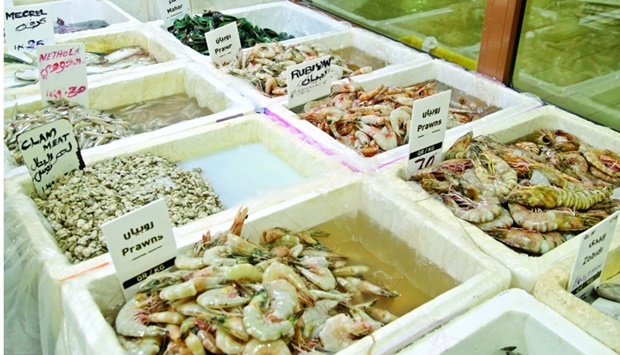Local fishermen have expressed different views regarding the ongoing ban on shrimp fishing in the Qatari waters, which has been in effect for around 31 years.
According to local Arabic daily Arrayah, some fishermen feel that such a ban has considerably contributed to the development and growth of fisheries in the country over the years, while others believe that it needs to be amended and modified to ease the restrictions and allow a certain number of entities to fish for shrimps using specified techniques and tools within well-defined time-frames.

Those in favour of easing the restrictions reason that this could lead to easing the demand on fishing for other varieties of seafood, in addition to checking the high prices of imported shrimps through to the availability of a local product.
Jassim al-Linjawi, a member of the fishermen's committee, said the decision to ban the fishing of shrimps locally was issued in 1991 and remains in effect. He explained that the decision was taken because it was observed that large quantities of small fish died during the process of fishing of shrimps.
This was because shrimps lived in the muddy seabed, which required the fishing nets to be lowered to around 20-30cm in the seabed. Due to this, a large number of small fish living there were caught in the nets and eventually died. Accordingly, the fisheries department and the entities concerned carried out an intensive field study in different areas, including Dukhan and others, and it was eventually decided to ban the practice.
He explained that similar experiences were seen in other GCC countries as well, and there is a ban on shrimp fishing in Bahrain and the UAE. Saudi Arabia allows it for around 5-6 months a year, while Oman permits it for one month only. Kuwait allows it for an annual season.
He suggested that the authorities concerned in Qatar should study the possibility of easing the ban with certain terms and conditions, allowing the fishing of shrimps while maintaining the wellbeing of the marine life and environment.
Similarly, fisherman Saif al-Fadala felt that the relevant entities should explore the possibility of permitting shrimp fishing locally for a period of three to four months while taking into consideration all the biological and environmental factors involved.
He said there are large quantities of shrimps in Qatar at the waters along the northern parts of the country and allowing a certain number of fishing vessels to catch them would be good for the local market if done through a well-regulated process, in addition to being safe for the environment.
Fisherman and fishing vessels owner Yousef al-Mannai stressed that the ban on fishing shrimps has more benefits for local fisheries than disadvantages. However, he added that designating some areas at certain times/seasons of the year to allow the fishing of shrimps would be an added benefit.
According to local Arabic daily Arrayah, some fishermen feel that such a ban has considerably contributed to the development and growth of fisheries in the country over the years, while others believe that it needs to be amended and modified to ease the restrictions and allow a certain number of entities to fish for shrimps using specified techniques and tools within well-defined time-frames.

A fishing boat at work
Those in favour of easing the restrictions reason that this could lead to easing the demand on fishing for other varieties of seafood, in addition to checking the high prices of imported shrimps through to the availability of a local product.
Jassim al-Linjawi, a member of the fishermen's committee, said the decision to ban the fishing of shrimps locally was issued in 1991 and remains in effect. He explained that the decision was taken because it was observed that large quantities of small fish died during the process of fishing of shrimps.
This was because shrimps lived in the muddy seabed, which required the fishing nets to be lowered to around 20-30cm in the seabed. Due to this, a large number of small fish living there were caught in the nets and eventually died. Accordingly, the fisheries department and the entities concerned carried out an intensive field study in different areas, including Dukhan and others, and it was eventually decided to ban the practice.
He explained that similar experiences were seen in other GCC countries as well, and there is a ban on shrimp fishing in Bahrain and the UAE. Saudi Arabia allows it for around 5-6 months a year, while Oman permits it for one month only. Kuwait allows it for an annual season.
He suggested that the authorities concerned in Qatar should study the possibility of easing the ban with certain terms and conditions, allowing the fishing of shrimps while maintaining the wellbeing of the marine life and environment.
Similarly, fisherman Saif al-Fadala felt that the relevant entities should explore the possibility of permitting shrimp fishing locally for a period of three to four months while taking into consideration all the biological and environmental factors involved.
He said there are large quantities of shrimps in Qatar at the waters along the northern parts of the country and allowing a certain number of fishing vessels to catch them would be good for the local market if done through a well-regulated process, in addition to being safe for the environment.
Fisherman and fishing vessels owner Yousef al-Mannai stressed that the ban on fishing shrimps has more benefits for local fisheries than disadvantages. However, he added that designating some areas at certain times/seasons of the year to allow the fishing of shrimps would be an added benefit.

